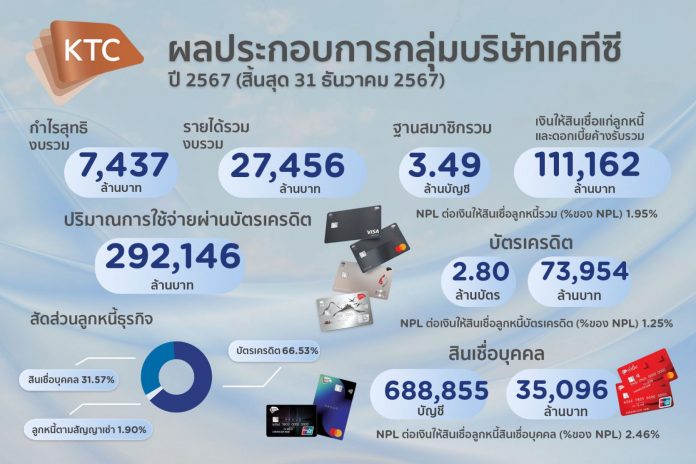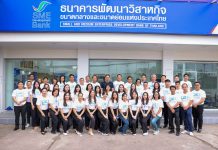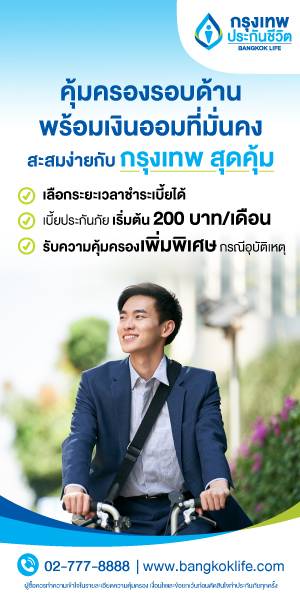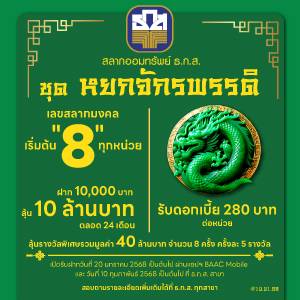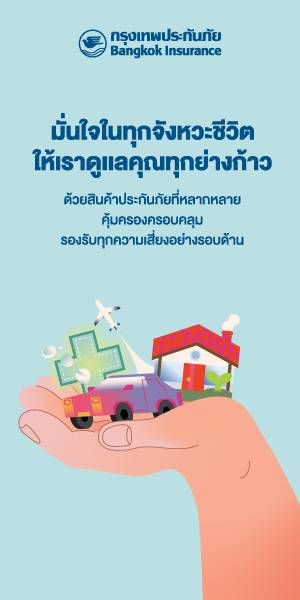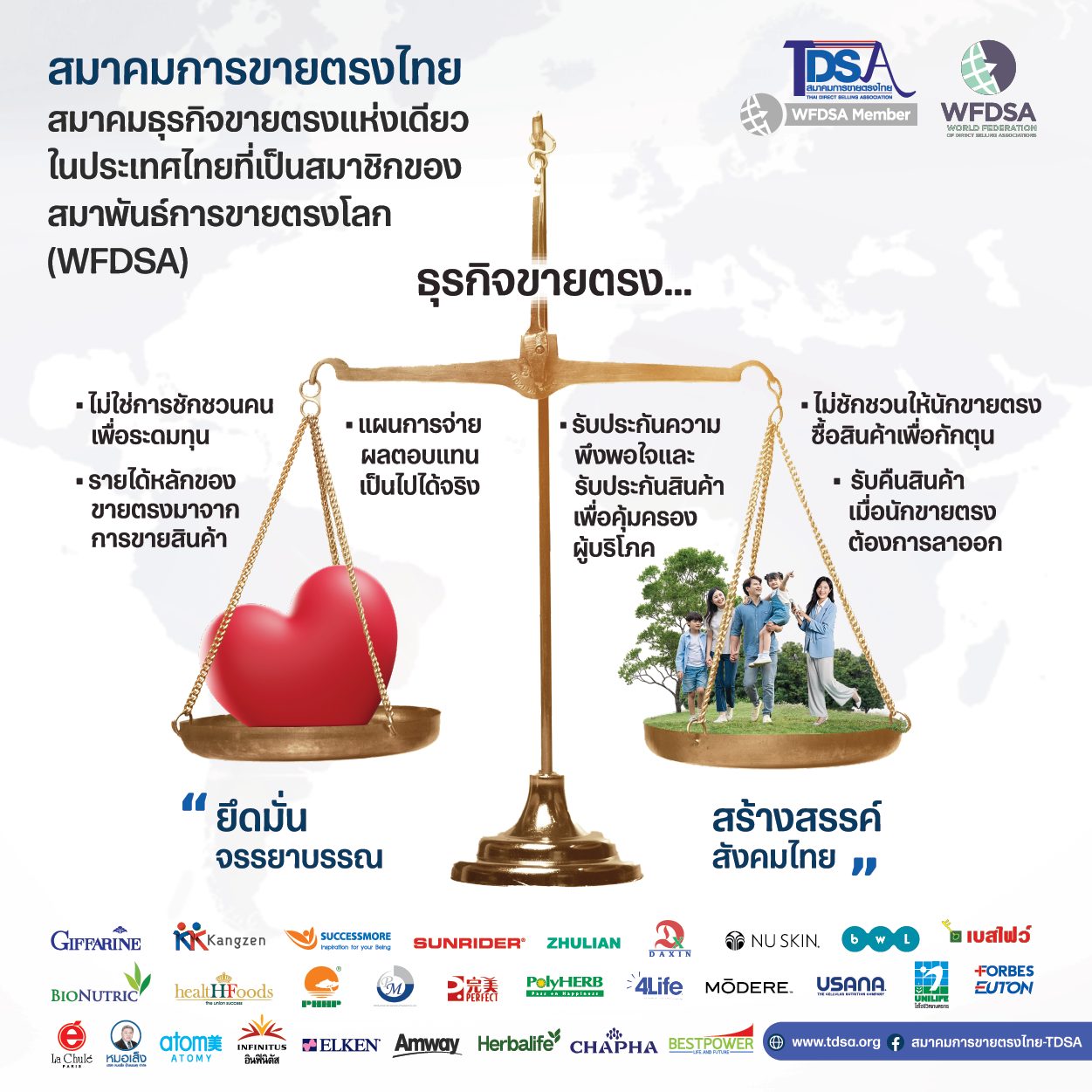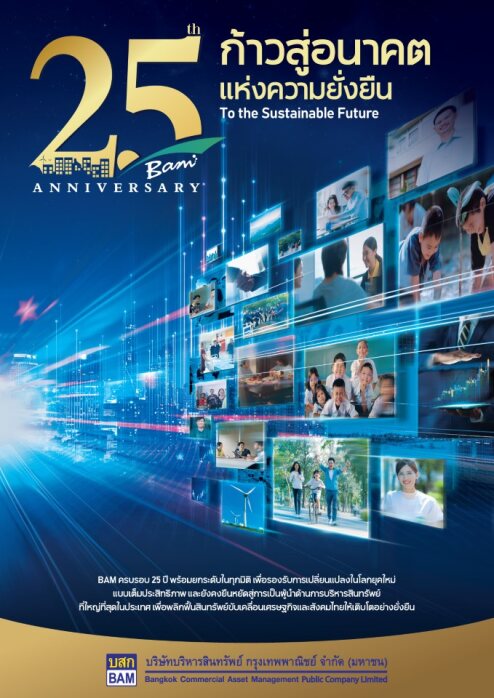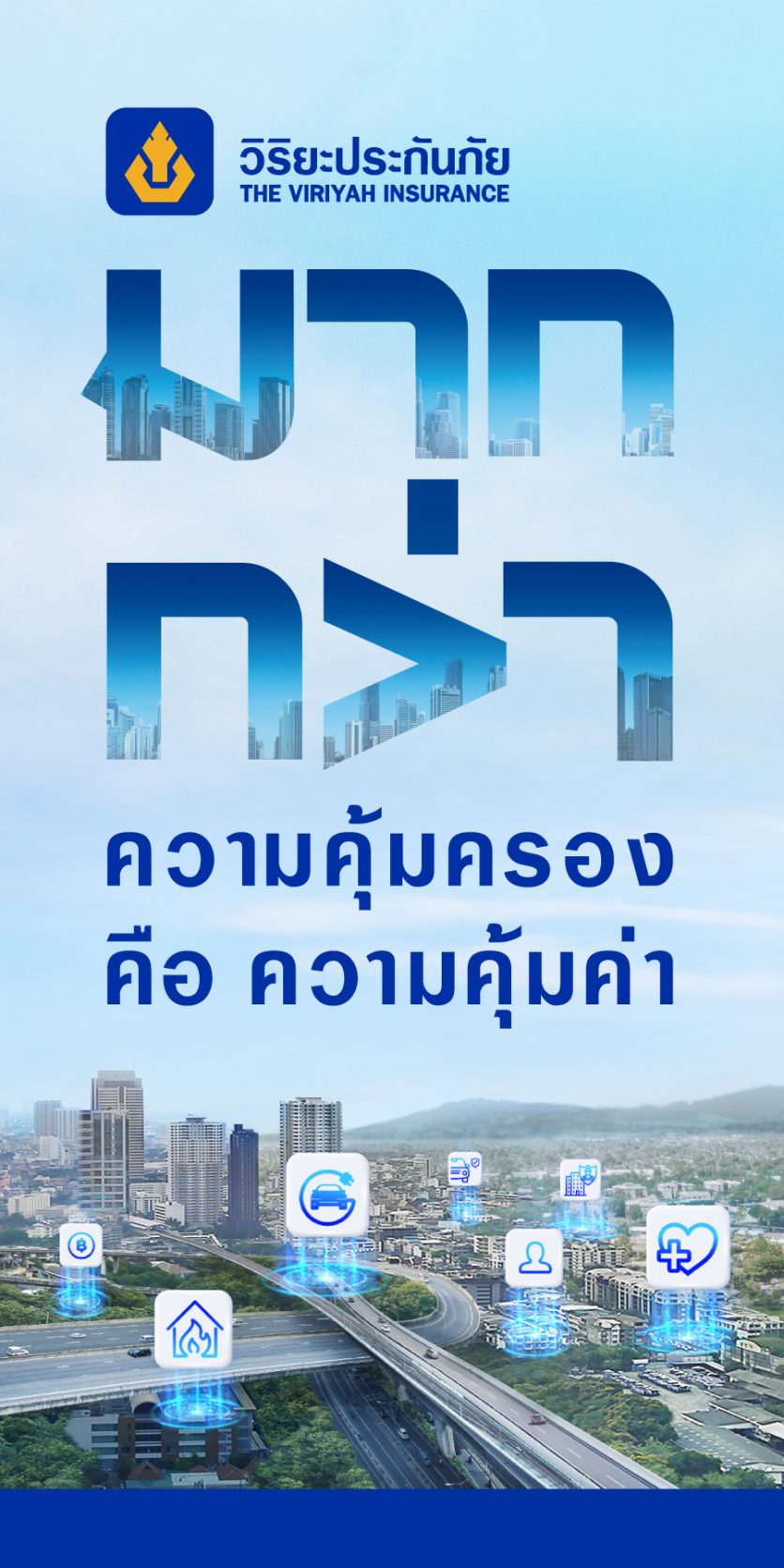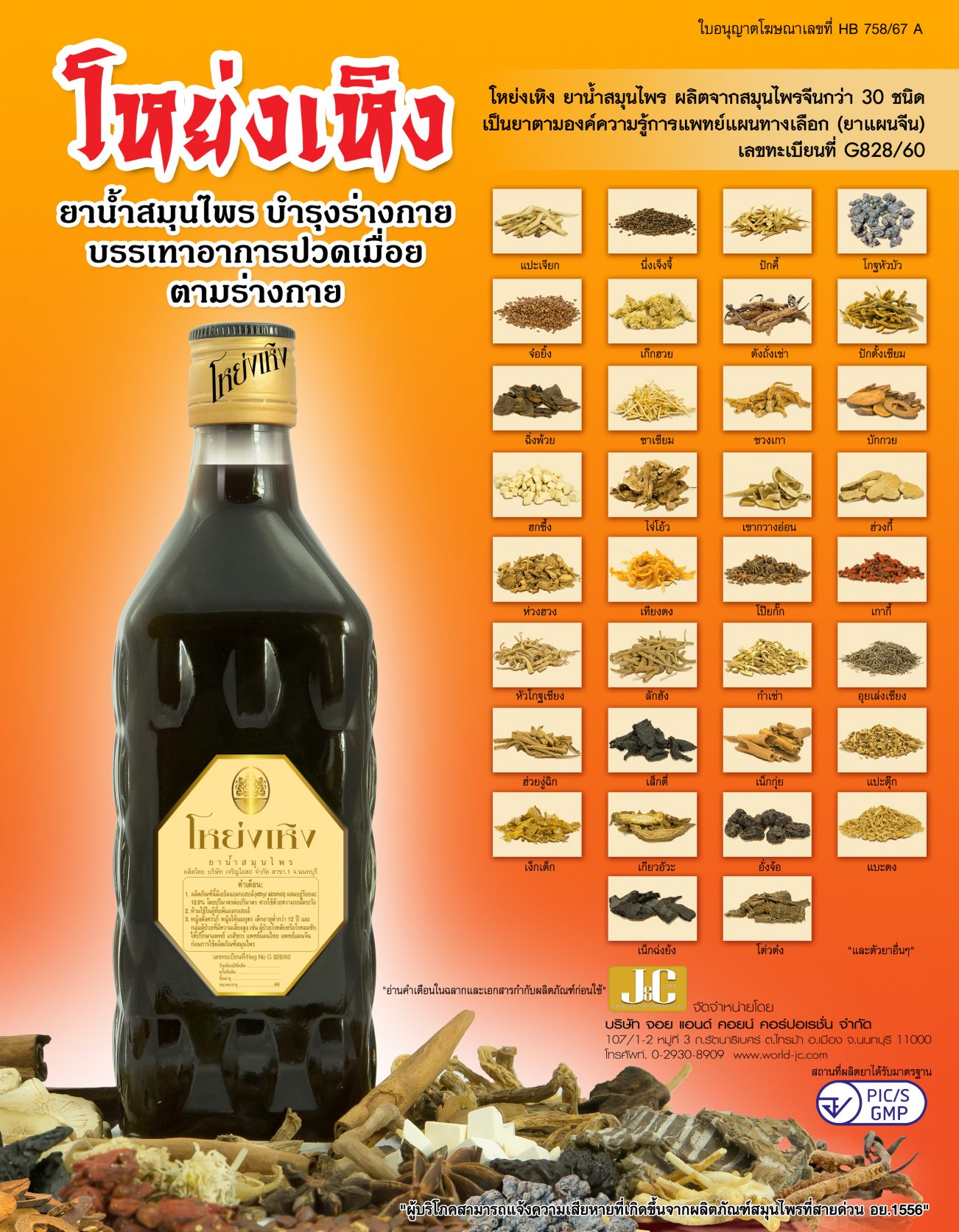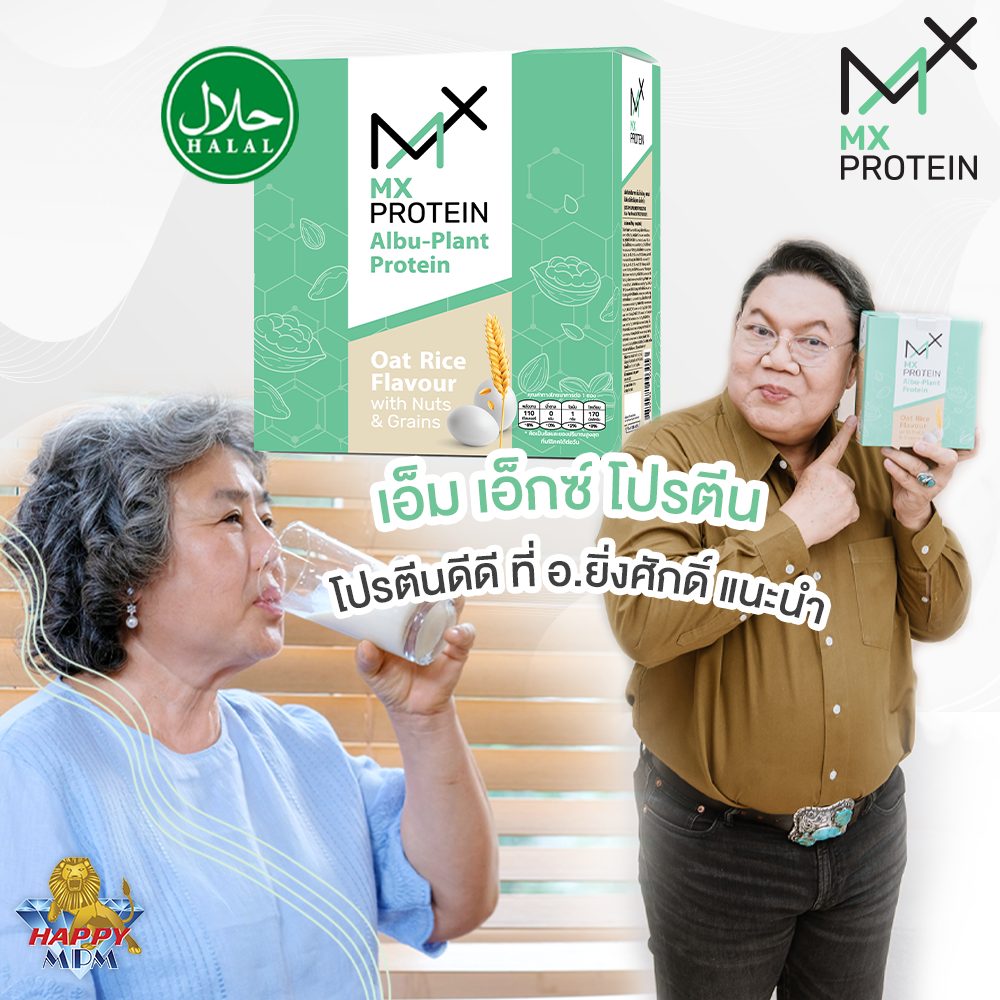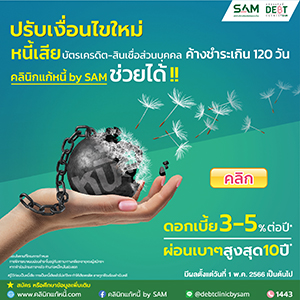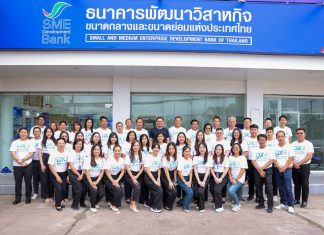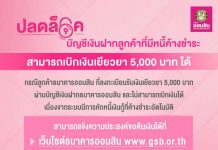เคทีซีและกลุ่มบริษัทเผยปี 2567 ทำกำไรสุทธิ 7,437 ล้านบาท เพิ่มขึ้น 1.9% จากปี 2566 ปริมาณการใช้จ่ายผ่านบัตรเครดิตสูงกว่าอุตสาหกรรม พอร์ตสินเชื่อรวมมีมูลค่า 111,162 ล้านบาท อัตราส่วนสินเชื่อด้อยคุณภาพต่อเงินให้สินเชื่อรวม (NPL Ratio) อยู่ที่ 1.95% พร้อมเดินหน้าสู่องค์กรดิจิทัลด้วยการปรับโครงสร้างระบบไอที เสริมประสิทธิภาพผลิตภัณฑ์และบริการ ควบคู่พัฒนาบุคลากรทำงานร่วมกับเทคโนโลยีดิจิทัล และบริหารคุณภาพพอร์ตสินเชื่อตลอดกระบวนการ (end to end) เติบโตด้วยความรับผิดชอบและเป็นธรรม อีกทั้งสานต่อมาตรการช่วยเหลือลูกหนี้ในหลายมิติ

นางพิทยา วรปัญญาสกุล ประธานเจ้าหน้าที่บริหาร “เคทีซี” หรือ บริษัท บัตรกรุงไทย จำกัด (มหาชน) กล่าวถึงภาพรวมอุตสาหกรรมว่า “แม้ว่าภาพรวมธุรกิจสินเชื่อผู้บริโภคจะชะลอตัวลง จากสภาวะเศรษฐกิจที่ทำให้ผู้บริโภคระมัดระวังการใช้จ่ายและสถานการณ์หนี้ครัวเรือนที่อยู่ในระดับสูง การดำเนินธุรกิจของเคทีซีในช่วง 11 เดือนที่ผ่านมา (มกราคม-พฤศจิกายน 2567) ยังสามารถครองส่วนแบ่งตลาดได้เพิ่มขึ้นจากช่วงเดียวกันของปี 2566 โดยสัดส่วนปริมาณการใช้จ่ายผ่านบัตรอยู่ที่ 13.0% เพิ่มขึ้นจาก 12.1% ในขณะที่สัดส่วนลูกหนี้บัตรเครดิตเทียบกับอุตสาหกรรมอยู่ที่ 15.0% จาก 14.7% และสัดส่วนของลูกหนี้สินเชื่อบุคคล (ไม่รวมสินเชื่อที่มีทะเบียนรถเป็นประกัน) เทียบกับอุตสาหกรรมอยู่ที่ 6.6% จาก 6.3%”
“เคทีซีและกลุ่มบริษัทยังคงสร้างผลกำไรในปี 2567 เพิ่มขึ้นต่อเนื่องอยู่ที่ 7,437 ล้านบาท ขณะที่พอร์ตสินเชื่อรวมมีมูลค่า 111,162 ล้านบาท ลดลง 1.1% ทั้งนี้ กลุ่มบริษัทยังคงเน้นการเติบโตมูลค่าพอร์ตควบคู่ไปกับการคัดกรองคุณภาพภายใต้ระดับความเสี่ยงที่เหมาะสม ซึ่งเป็นรากฐานสำคัญในการเติบโตอย่างยั่งยืน โดยพอร์ตลูกหนี้บัตรเครดิตหดตัว 0.7% เป็นผลจากสภาพเศรษฐกิจที่มีส่วนให้ผู้บริโภคระมัดระวังการจับจ่ายใช้สอย รวมทั้งการปรับเพิ่มอัตราการผ่อนชำระขั้นต่ำ ขณะที่พอร์ตสินเชื่อบุคคลขยายตัวที่ 1.1% จากการเพิ่มขึ้นของสินเชื่อ “เคทีซี พี่เบิ้ม รถแลกเงิน” สำหรับ NPL Ratio อยู่ในระดับต่ำที่ 1.95% บรรลุตามกรอบเป้าหมายที่ตั้งไว้ที่ ≤ 2% อัตราการขยายตัวของปริมาณการใช้จ่ายผ่านบัตรในปี 2567 อยู่ที่ 10.1% โตกว่าค่าเฉลี่ยของอุตสาหกรรม เป็นผลจากการจัดกิจกรรมการตลาดที่ตอบโจทย์ความต้องการสมาชิก”
บริษัทมีฐานสมาชิกรวม 3,488,156 บัญชี โดยแบ่งเป็นพอร์ตสมาชิกบัตรเครดิต 2,799,301 บัตร เงินให้สินเชื่อแก่ลูกหนี้บัตรเครดิตและดอกเบี้ยค้างรับรวม 73,954 ล้านบาท ปริมาณการใช้จ่ายผ่านบัตรในปี 2567 เท่ากับ 292,146 ล้านบาท NPL Ratio บัตรเครดิตอยู่ที่ 1.25% พอร์ตสมาชิกสินเชื่อบุคคลรวม 688,855 บัญชี คิดเป็นเงินให้สินเชื่อแก่ลูกหนี้สินเชื่อบุคคล และดอกเบี้ยค้างรับรวม 35,096 ล้านบาท ส่วนหนึ่งเป็นยอดเงินให้สินเชื่อแก่ลูกหนี้ “เคทีซี พี่เบิ้ม รถแลกเงิน” เท่ากับ 3,015 ล้านบาท NPL Ratio สินเชื่อบุคคลอยู่ที่ 2.46% สำหรับสินเชื่อลูกหนี้ตามสัญญาเช่ามูลค่า 2,112 ล้านบาท โดยเคทีซีได้หยุดการปล่อยสินเชื่อประเภทนี้ตั้งแต่เดือนสิงหาคม 2566 ปัจจุบันมุ่งเน้นการติดตามหนี้และบริหารจัดการคุณภาพพอร์ตสินเชื่อที่มีอยู่
ผลการดำเนินงานของกลุ่มบริษัทเคทีซีสำหรับปี 2567 มีรายได้รวมเท่ากับ 27,456 ล้านบาท เพิ่มขึ้น 8.0% จากปี 2566 จากรายได้ดอกเบี้ยและรายได้ค่าธรรมเนียม รวมถึงหนี้สูญได้รับคืนที่ขยายตัวได้ดี ขณะที่ค่าใช้จ่ายรวมเท่ากับ 18,190 ล้านบาท เพิ่มขึ้น 10.9% จากค่าใช้จ่ายในการบริหาร โดยหลักๆ เพิ่มขึ้นจากค่าธรรมเนียมจ่ายที่สูงขึ้นตามปริมาณธุรกรรมที่ขยายตัว สำหรับผลขาดทุนด้านเครดิตที่คาดว่าจะเกิดขึ้น (ECL) เพิ่มขึ้น 14.7% จากปี 2566 เป็นผลจากการตัดหนี้สูญที่เร็วขึ้นตามนโยบายการตัดหนี้สูญใหม่ และการตั้งสำรองสูงขึ้นตามหลักความระมัดระวัง นอกจากนี้ต้นทุนทางการเงินเพิ่มขึ้นเป็น 2.8% จาก 2.6% ในปี 2566 เนื่องจากมีหุ้นกู้บางส่วนครบกำหนดและ เคทีซีมีการออกหุ้นกู้ใหม่ด้วยอัตราดอกเบี้ยจ่ายที่สูงขึ้นกว่าในอดีต เป็นผลให้ค่าใช้จ่ายทางการเงินเพิ่มขึ้น ขณะที่ผลตอบแทนเงินให้สินเชื่อสำหรับปี 2567 อยู่ที่ 14.5% ลดลงเล็กน้อยจากปี 2566 ซึ่งอยู่ที่ 14.8% ส่งผลให้ส่วนต่างอัตราดอกเบี้ยสุทธิปี 2567 เท่ากับ 12.9% ลดลงจากปี 2566 ซึ่งอยู่ที่ 13.2%
ในส่วนของแหล่งเงินทุน ข้อมูลเมื่อวันที่ 31 ธันวาคม 2567 กลุ่มบริษัทมีเงินกู้ยืมทั้งสิ้น 62,336 ล้านบาท (รวมหนี้สินตามสัญญาเช่า) แบ่งสัดส่วนโครงสร้างแหล่งเงินทุนเป็นเงินกู้ยืมระยะสั้น (รวมส่วนของเงินกู้ยืมและหุ้นกู้ที่ครบกำหนดชำระภายในหนึ่งปี) 37% และเงินกู้ยืมระยะยาว 63% โดยแบ่งเป็นเงินกู้ยืมระยะสั้นจากธนาคารกรุงไทยและบริษัทที่เกี่ยวข้องกัน จำนวน 5,119 ล้านบาท สถาบันการเงินอื่น 5,000 ล้านบาท เงินกู้ยืมระยะยาวจากธนาคารกรุงไทย 9,500 ล้านบาท และหุ้นกู้จำนวน 42,290 ล้านบาท อัตราส่วนของหนี้สินต่อส่วนของผู้ถือหุ้นอยู่ที่ 1.78 เท่า ลดลงเมื่อเทียบกับสิ้นปีก่อนหน้าซึ่งอยู่ที่ 2.15 เท่า ต่ำกว่าภาระผูกพัน (Debt Covenants) ซึ่งกำหนดไว้ที่ 10 เท่า
เคทีซียังคงมีมาตรการให้ความช่วยเหลือลูกหนี้อย่างต่อเนื่อง ตามประกาศของ ธปท. ที่ สกช. 7/2566 เรื่อง หลักเกณฑ์การให้สินเชื่ออย่างรับผิดชอบและเป็นธรรม (Responsible Lending: RL) โดยบริษัทจะพิจารณาให้สอดคล้องกับความสามารถในการชำระหนี้ของลูกหนี้ และไม่ทำให้ลูกหนี้มีภาระหนี้เพิ่มขึ้นจากภาระหนี้เดิมเกินสมควร รายละเอียดเพิ่มเติมคลิก www.ktc.co.th/about/news/meaure สำหรับการให้ความช่วยเหลือลูกหนี้ที่เป็นหนี้เรื้อรัง ( Severe Persistent Debt: SPD) ตลอดปี 2567 คิดเป็นช่วงเวลา 9 เดือน นับตั้งแต่เกณฑ์ SPD มีผลบังคับใช้ในวันที่ 1 เมษายน 2567 และในเดือนสิงหาคม 2567 ธปท.ได้ออกข่าวว่า จะมีการขยายระยะเวลาการปิดจบหนี้จากภายในระยะเวลา 5 ปี เป็น 7 ปี เพื่อลดภาระค่างวดต่อเดือน ทั้งนี้ ต้องรอประกาศอย่างเป็นทางการเพื่อสรุปรายละเอียดเงื่อนไข โดยในปี 2567 เคทีซีมีลูกหนี้สมัครเข้าร่วมโครงการฯ คิดเป็นผลกระทบต่อรายได้ดอกเบี้ยจริงลดลงไปประมาณ 300,000 บาทต่อเดือน โดยคำนวณจากลูกหนี้ที่เข้าเกณฑ์และเข้าร่วมโครงการ
เนื่องจากเคทีซีเป็นผู้ประกอบธุรกิจ Non-Bank ที่เป็นบริษัทในกลุ่มธุรกิจการเงินของธนาคารกรุงไทย จำกัด (มหาชน) จึงเป็นหนึ่งในบริษัทที่ให้ความร่วมมือกับธนาคารแห่งประเทศไทย ในมาตรการเพื่อช่วยเหลือลูกหนี้ภายใต้ชื่อโครงการ “คุณสู้ เราช่วย” โดยสมาชิกสามารถลงทะเบียนผ่าน www.bot.or.th/khunsoo ตั้งแต่วันที่ 12 ธันวาคม 2567 – 28 กุมภาพันธ์ 2568 นอกจากนี้ สมาชิกบัตรเครดิตเคทีซียังมีสิทธิ์ร่วมมาตรการลดภาระทางการเงิน โดยการรับเครดิตดอกเบี้ยคืนเข้าบัญชีบัตรเครดิตของลูกหนี้ สำหรับสมาชิกบัตรที่ชำระหนี้ขั้นต่ำมากกว่าหรือเท่ากับ 8% ของยอดเงินที่เรียกเก็บภายในวันครบกำหนดชำระตามใบแจ้งยอดค่าใช้จ่าย ภายในระยะเวลาของมาตรการฯ ระหว่างวันที่ 1 มกราคม 2568 – 31 ธันวาคม 2568 โดยสามารถศึกษารายละเอียดของมาตรการนี้ผ่านลิงค์ www.ktc.co.th/financial-relief-credit
นางพิทยากล่าวว่า “การดำเนินความช่วยเหลือลูกหนี้ตามมาตรการต่างๆ ข้างต้น เคทีซีพิจารณาแล้วคาดว่าจะไม่มีผลกระทบอย่างมีนัยสำคัญต่อผลการดำเนินงานของกลุ่มบริษัทในภาพรวม สำหรับปี 2568 เคทีซีตั้งเป้ายกระดับองค์กรสู่ดิจิทัลอย่างยั่งยืน ภายใต้แผนกลยุทธ์ “Building a Sustainable Future Through Digital Transformation” ด้วยการเสริมประสิทธิภาพระบบไอทีและโครงสร้างการทำงานเชิงลึกระหว่างคนกับเทคโนโลยี เพื่อพัฒนาผลิตภัณฑ์และบริการที่ตอบโจทย์ความต้องการของสมาชิกในหลากหลายมิติ ควบคู่กับการบริหารพอร์ตสินเชื่อรวมให้เติบโต ภายใต้หลักเกณฑ์การให้สินเชื่ออย่างรับผิดชอบและเป็นธรรม ใน 3 ธุรกิจหลักคือ บัตรเครดิต บัตรกดเงินสด “เคทีซี พราว” และสินเชื่อ “เคทีซี พี่เบิ้ม รถแลกเงิน” เพราะยังเห็นโอกาสเติบโตจากความต้องการสินเชื่อแต่ละประเภทของผู้บริโภค และที่สำคัญคือการดำเนินธุรกิจให้มีผลกำไรเติบโตต่อเนื่อง บริหารจัดการพอร์ตสินเชื่อคุณภาพให้ขยายตัวมากขึ้น ภายใต้ความเสี่ยงที่ยอมรับได้อย่างเหมาะสม โดยเคทีซีคาดว่าในปี 2568 ปริมาณใช้จ่ายผ่านบัตรเครดิตจะเติบโต 10% พอร์ตสินเชื่อรวมเติบโตประมาณ 4-5% พอร์ตสินเชื่อ “เคทีซี พราว” เติบโต 3% มูลค่าสินเชื่อใหม่ “เคทีซี พี่เบิ้ม รถแลกเงิน” เท่ากับ 3,000 ล้านบาท อย่างไรก็ตาม หากในปี 2568 เศรษฐกิจไทยมีความแข็งแกร่ง เคทีซีเชื่อว่าธุรกิจจะสามารถเติบโตได้ดีกว่าเป้าหมายที่ตั้งไว้”
KTC Group announces continuous profit for the year 2024 of 7,437 million baht. Strengthening the group with IT systems and maintaining portfolio quality.
KTC and its subsidiaries announced a net profit for the year 2024 of 7,437 million baht, increased by 1.9% from 2023. Total credit card spending was higher than the industry. Total receivables portfolio amounted to 111,162 million baht, with the NPL Ratio of 1.95%. KTC is moving towards a digital organization by adjusting IT infrastructure, enhancing product and service efficiency, along with developing personnel to work with digital technology, and managing end to end portfolio quality responsibly and fairly, as well as assisting debtors continuously in various dimensions.
Mrs. Pittaya Vorapanyasakul, President & Chief Executive Officer, “KTC” or Krungthai Card Public Company Limited, stated, “even though the overall consumer finance industry slowed down as consumers are more cautious on their spending together with high level of household debt, KTC’s market share over the past 11 months (January-November 2024) increased from the same period in 2023. The credit card spending increased from 12.1% to 13.0% while the credit card receivables compared to the industry increased from 14.7% to 15.0% and the personal loan receivables (excluding car title loan) compared to the industry also increased from 6.3% to 6.6%.”
“KTC and its subsidiaries generated higher profit in 2024 to 7,437 million baht, while total receivables portfolio amounted to 111,162 million baht, decreased by 1.1%. The group is still focusing on growing portfolio along with maintaining asset quality at an appropriate risk level, which are key fundamentals for sustainable growth. Total credit card receivables decreased by 0.7% due to cautious consumer spending from the economic environment, including an increase of the minimum payment rate. . Meanwhile, the personal loan receivables increased by 1.1% due to an increase of “KTC P BERM Car for Cash” loan. The NPL Ratio was low at 1.95%, achieved the target range of ≤2%. The credit card spending for the year 2024 grew at 10.1%, higher than the industry average, thanks to marketing campaigns that match members’ needs.”
The total membership base numbered 3,488,156 accounts, comprising of 2,799,301 cards in the credit card business, and total loans to credit card customers and accrued interest receivables of 73,954 million baht. Credit card spending for the year 2024 was 292,146 million baht and NPL Ratio for credit cards was at 1.25%. There were 688,855 accounts in the KTC personal loan portfolio, with loans to personal loan customers and accrued interest receivables of 35,096 million baht. “KTC P BERM CAR FOR CASH” receivables totaled 3,015 million baht. NPL Ratio for personal loans portfolio was at 2.46%. For lease receivables equaled to 2,112 million baht, KTC has stopped granting this type of loan since August 2023. KTC is currently focusing on debt collection and managing the quality of existing portfolios.
Total revenue for the year 2024 compared to the same period last year showed a growth of 8.0% equaled to 27,456 million baht, mainly from interest income, fee income and growing recovery income. Meanwhile, total expenses increased by 10.9%, equaled to 18,190 million baht mainly from administrative expenses, increased fees and services in response to transaction volume. In addition, expected credit losses (ECL) increased by 14.7% from 2023, mainly from accelerated write-offs under the new policy and higher provisions according to the principle of prudence. The cost of funds also increased from 2.6% in 2023 to 2.8% due to some debentures matured and KTC issued new debentures with higher interest rates, resulting in increased financial expenses. The yield on loan for the year 2024 was at 14.5%, slightly down from the previous year’s 14.8%. As such, the net interest margin in 2024 was 12.9%, decreased from 13.2% in 2023.
The group’s total borrowings as of December 31, 2024 amounted to 62,336 million baht (including lease liabilities), comprising 37% of short-term borrowings (including loans and debentures due within one year) and 63% of long-term borrowings. Short-term borrowings consisted of loans from related parties 5,119 million baht and other financial institutions 5,000 million baht, as well as long-term loans from Krungthai Bank 9,500 million baht and debentures 42,290 million baht. The debt-to-equity ratio was 1.78 times, lower than the 2.15 times at the end of the previous year, and below the Debt Covenants threshold of 10 times.
KTC has implemented ongoing debt relief measures per the BOT’s announcement No. SorKorChor. 7/2566 regarding Responsible Lending (RL) criteria. The Company assesses each debtor’s repayment capability to ensure no unreasonable increase in their debt burden relative to their original obligations. For further details, please refer to the link www.ktc.co.th/about/news/measure For the year 2024, which accounted for 9 months since the implementation of the Severe Persistent Debt (SPD) criteria on April 1, 2024, and in August 2024, the BOT announced to extend the debt settlement period from 5 to 7 years to ease monthly repayment burden, yet waiting to be finalized in details and official announcement, KTC debtors participated in the program had an actual impact on interest income of approximately 300,000 baht per month, assuming full participation from all eligible debtors in the program.
As KTC is a Non-Bank business operator, a company under the financial business group of Krungthai Bank Public Company Limited, the Company cooperates with the BOT in measures to assist debtors under the project “Khun Soo Rao Chuay” (You Fight, We Help) where members can register via www.bot.or.th/khunsoo from December 12, 2024 to February 28, 2025. Furthermore, KTC credit card members are also entitled to participate in the financial relief measure by receiving interest credit back to the debtor’s credit card account for card members who make a minimum payment of more than or equal to 8% of the amount charged within the payment due date as stated in the statement, starting from January 1, 2025 to December 31, 2025. For further details, please refer to the link www.ktc.co.th/financial-relief-credit
Mrs. Pittaya stated, “the debt relief measures mentioned above will not significantly affect the group’s overall performance. For 2025, KTC aims at achieving comprehensive digital transformation and sustainable growth under the strategic plan, “Building a Sustainable Future Through Digital Transformation” by enhancing the efficiency of IT systems and in-depth working structures between people and technology to develop products and services that meet members’ needs in various dimensions, along with managing the receivables portfolio to grow under responsible and fair lending principles. KTC has established growth targets for its 3 primary business segments: the Credit Card Business, “KTC PROUD”, and “KTC P BERM Car for Cash”, recognizing the continued consumer demand for each of these financial products. Most importantly, the Company aims to achieve sustainable profit growth while maintaining a high-quality receivables portfolio, expanding under a framework of appropriate risk level. In 2025, Credit Card spending is projected to grow by 10%, total receivables portfolio by 4-5%, “KTC PROUD” by 3% and “KTC P BERM Car for Cash” new receivables of 3,000 million baht. Nevertheless, if the Thai economy is robust in 2025, KTC believes that the Company will be able to beat the set target.”



